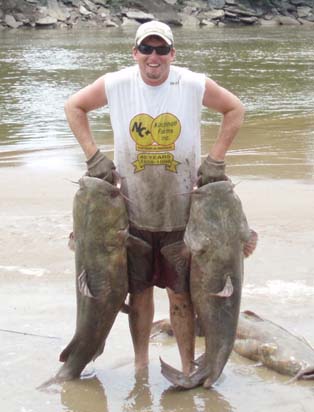Effects of Anthropogenic Disturbance of Fish Community and Food Web Structure in a Great Plains River
Investigators: 
Jeff Eitzmann, M.S. student
Dr. Craig Paukert
Project Supervisor:
Dr. Craig Paukert
Funding:
Kansas Department of Wildlife and Parks
Cooperators:
Kansas Department of Wildlife and Parks
Location:
Kansas River in eastern Kansas Completion
October 2009
Objectives:
Determine the fish community structure within the Kansas River and how the structure relates to anthropogenic disturbance.
Determine if trophic structure differs by anthropogenic disturbances (e.g. land use and in stream habitat) or fish density within a large river.
Progress and Results:
Fishes were collected at ten sites throughout the Kansas River for assessing assemblage structure in summer 2007 using fish community metrics and at 3 sites in 2006 for food web structure using stable isotope analysis. Satellite imagery indicated the Kansas River was dominated by agriculture in the upper reaches and tended to increase in urban land use in the lower reaches. In stream habitat also decreased with increased urban area. Reaches directly above Bowersock Dam in Lawrence, Kansas and below the Johnson County Weir, near Kansas City, Kansas had low percent similarity compared to other reaches, suggesting the dam and the weir affect community composition. Canonical correspondence analysis indicated that species that prefer high velocity flows and sandy substrate (blue sucker and shovelnose sturgeon) are associated with the upper river reaches. The lower reaches contain more tolerant, macro habitat generalist species and the upper river contained more intolerant, fluvial specialist species. The agricultural reach had higher variability in δ13C for fish classified as piscivores/insectivores and macro invertebrates suggesting the heterogeneous habitat in the agricultural reach provided more variable food sources. The δ15N values also indicated that ten of the twelve fish species tended to consume prey at higher trophic levels in the agricultural reach suggesting a more complex food web. Conserving intolerant, native species in the Kansas River may require maintaining suitable habitat for these species and restoration of impacted areas of the river.
Products:
Eitzmann, J. L., and C. P. Paukert. 2010. Longitudinal differences in habitat complexity and fish assemblage structure of a Great Plains River. American Midland Naturalist 163:14-32.
Eitzmann, J. L., and C. P. Paukert. 2010. Urbanization in a Great Plains river: effects on fishes and food webs. River Research and Applications 26:948-959.
Eitzmann, J. L. 2008. Effects of anthropogenic disturbance on the fish assemblage and food web structure in a Great Plains river. M.S. Thesis, Kansas State University.
Paukert, C. P., and J. Eitzmann. 2008. Food web dynamics of a Great Plains river: effects of habitat alteration. Arizona/New Mexico Joint Annual Meeting, Prescott, AZ.
Eitzmann, J. L., and C. P. Paukert. 2008. Effects of anthropogenic changes on food web dynamics in a Great Plains river. Kansas Natural Resources Conference, Wichita, KS.
Eitzmann, J. L., and C. P. Paukert. 2007. Evaluation of multiple gears to assess a Great Plains river fish community. American Fisheries Society Annual Meeting, San Francisco, CA.
Eitzmann, J., and C. Paukert. 2007. Electrofishing and hoopnetting gear comparisons for fish communities in the Kansas River, Kansas. Kansas, Nebraska, Iowa Tri-State American Fisheries Society Meeting, Council Bluffs, IA.
Eitzmann, J. L., and C. P. Paukert. 2006. Comparison of electrofishing and trammel netting of shovelnose sturgeon in the Kansas River. 67th Midwest Fish and Wildlife Conference, Omaha, NE.